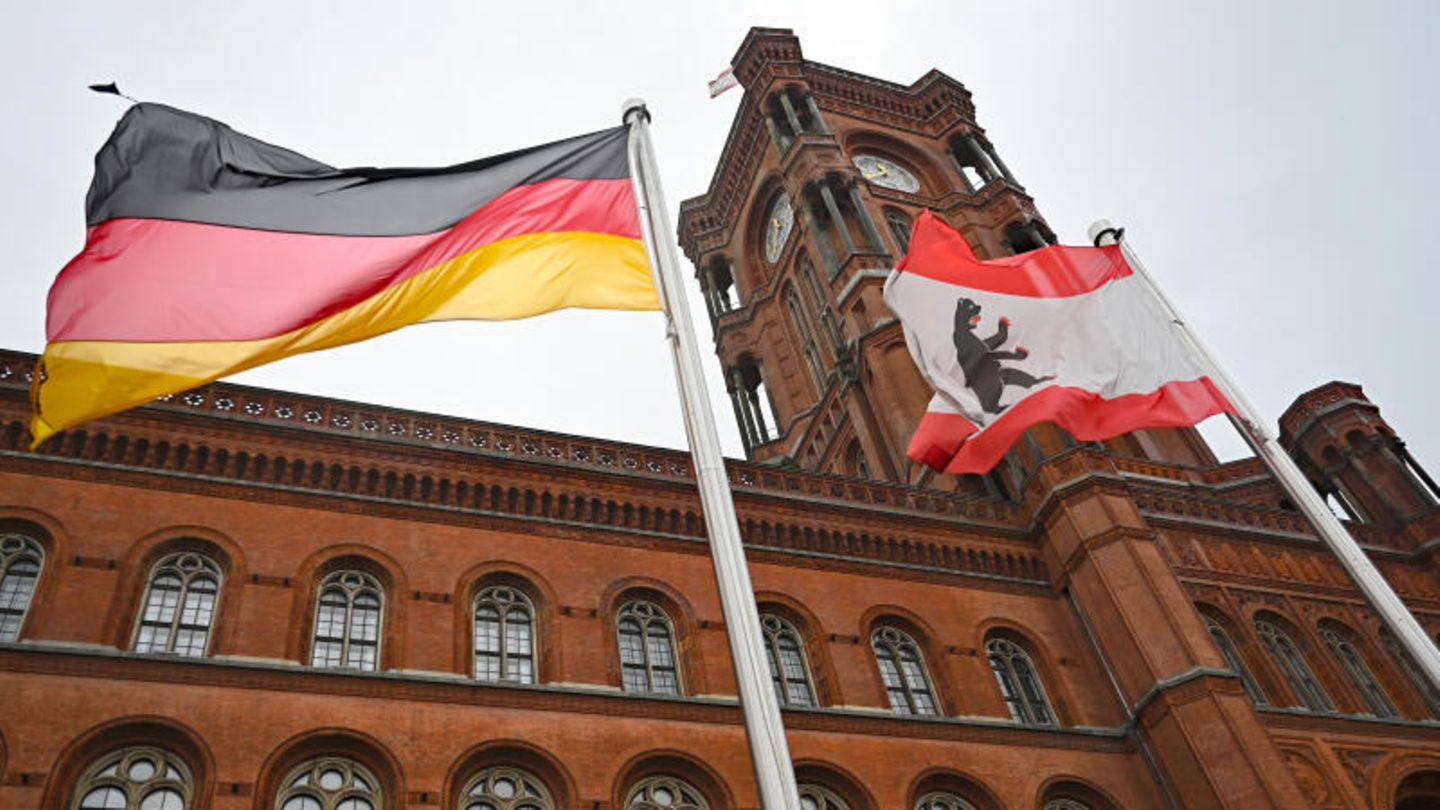After the crushing election defeat of the SPD in Berlin, the signs are on black. If you think so. Because despite their victory, the CDU is possibly too isolated for a successful search for a partner. A look at the possible constellations.
After the election is before the formation of a government. Although some parties, above all the SPD, would like to digest the results in Berlin for a while, there is little time for mourning.
The next government needs 80 of the 159 seats in the Red City Hall. Three coalitions are possible for this absolute majority. Despite the strong election result, it is by no means certain that CDU top man Kai Wegner, who achieved the best election result with his party in 20 years, will ultimately replace Franziska Giffey (SPD).
A look at the possible alliances.
Black green
From the CDU’s point of view, there is no hurry to form a new government. He wanted to “give everyone the time they need, because one or the other still seems to be in shock,” said Wegner, who won 28.2 percent of the votes with his party. Nevertheless, he wanted to invite to exploratory talks this Monday evening. The aim is to hold talks this week or early next week, Wegner told the German Press Agency on Monday.
Wegner had previously let it be known that he wanted to campaign for the formation of a two-party coalition with his party. In exploratory talks with both the Greens and the SPD, he wants to find out “whether we can create a modernization coalition,” Wegner said on Monday on Bayerischer Rundfunk.
In principle, nothing stands in the way of a black-green alliance – not even from the point of view of the potential junior partner. Greens’ top candidate Bettina Jarasch has already declared that she wants to conduct exploratory talks “seriously”. “If the CDU invites us to talk, we will actually have serious talks,” said Jarasch on Deutschlandfunk on Monday. This is “natural” for them.
At the same time, Jarasch pointed out that between the CDU and the Greens “the path is “undoubtedly a little further” than elsewhere. This is “but due to both parties”. In the capital there is “a very progressive Greens state association and “a very very conservative CDU”.
Black red
In theory, an alliance of convenience between winners and losers is also possible. After all, Wegner not only cares about environmental issues, but also about the city’s social policy, the Christian Democrat asserted. A black-red alliance would also have 86 seats.
“Of course we will be available for talks with the CDU, that’s simply what democratic practice demands,” said Giffey on Monday on the Berlin-Brandenburg radio station. However, she wanted to “of course also talk to our coalition partners”.
If, contrary to expectations, the alliance comes about, Giffey’s days as mayor of Berlin would probably be numbered.
Red-Red-Green
Despite the crushing defeat for the SPD, everything could (with a few restrictions) remain the same. Despite the SPD’s historically poor election results, Berlin’s Prime Minister Giffey wants to talk to the Greens and the Left about a possible continuation of the coalition. “If the SPD is able to lead a strong government, then for us that’s a point that we can’t just push aside,” said Giffey on Monday morning on RBB Inforadio. SPD federal chairman Lars Klingbeil has also spoken out in favor of continuing the three-party coalition. However, it should not go on like this. Because the SPD is just ahead of the Greens after counting all the votes, Giffey could remain governing mayor in this case.
Wegner, on the other hand, warned the previous governing coalition against a new edition. “All three governing parties – SPD, Greens and Left – have lost,” he said. The SPD had the historically worst election result it has ever had in Berlin – “and the Berlin CDU has a clear government mandate”. From the point of view of CSU boss Markus, the continuation of the old alliance would have “no legitimacy at all”. On the contrary: “It would actually be a reversal of the election result, a gross disregard for democracy” should the SPD, Greens and Left form a coalition again, says Söder.
Finding a partner might take time
Election researcher Thorsten Faas now expects the formation of a government to be lengthy. Despite the CDU’s high gains, it is difficult to read a “government signal” from the election result, Faas told the German Press Agency. “The ball is in the hands of the Union. But whether they will succeed in forming a majority is more than open.”
The previous Senate will remain in office in the meantime. “If one of the two parties decides to switch to the CDU, it will be difficult for the green or red because they actually feel like they are the political opponents,” said the politics professor at the Free University of Berlin.
Source: Stern
I have been working in the news industry for over 6 years, first as a reporter and now as an editor. I have covered politics extensively, and my work has appeared in major newspapers and online news outlets around the world. In addition to my writing, I also contribute regularly to 24 Hours World.




